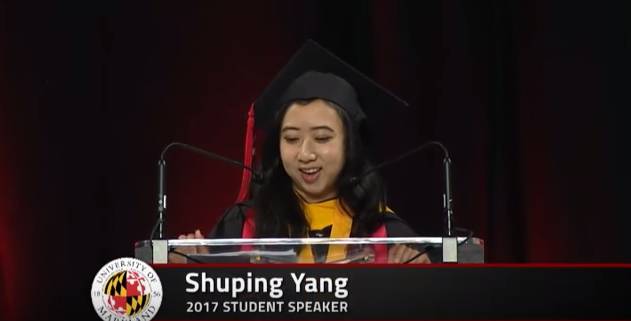

The honor of speaking at a university commencement has been shattered for one Chinese graduate of the University of Maryland, after her speech drew widespread criticism for bolstering negative Chinese stereotypes.
The speaker, Yang Shuping, began her speech at the ceremony on May 21 (local time), explaining that it was “fresh air” that made her come to the university in the first place.

“Five years ago, as I stepped off the plane from China and left the terminal at Dallas Airport, I was ready to put on one of my five face masks. But when I took my first breath of American air, I put my mask away. The air was so sweet and fresh, and oddly luxurious,” said Yang, adding that she felt surprised because she grew up in a Chinese city “where I had to wear a face mask every time I went outside; otherwise, I might get sick.”
The graduate then continued, claiming that she would be “forever grateful” for the “fresh air of free speech,” since she used to be convinced that only authority figures could define the truth.
The speech, though outwardly inspirational, soon triggered discontent among Chinese students around the U.S. Some complained that Yang had deliberately exaggerated the air conditions in her hometown of Kunming, which in fact has some of the best air quality of any Chinese city.
Many wrote on social media that they were ashamed of Yang for delivering such a biased speech, playing up the wrong stereotypes about China. Netizens opined that the speech was in especially poor taste given that her parents, who allegedly know little English, were present at the ceremony.
In response, an online activity has been launched to call on Chinese students in the U.S. to make videos to introduce themselves and their hometowns in a more objective way. Students at the University of Maryland reportedly mulled to rally with T-shirts reading "Proud of China." They also expected the university, known for its truth-seeking and diversity, to answer to the calls.
“I also come from the city of Kunming ... From my experience in the last few years, Kunming's air quality on average is at least as good as [the air quality] in Washington D.C. In the U.S., we share the same rights and values of free speech, but public speech not based on the truth is really inappropriate. Especially when the false contents (lies) in the speech hurt the feelings of a large group of people and damage the image of a nation,” commented a Facebook user named Jun Zhang.
A Chinese PhD student at the University of Maryland who requested anonymity told the People’s Daily Online that he though it was normal for people to express different opinions, but that it was inappropriate for Yang to make her comments as a student representative who speaks for more than herself.
Another Chinese student who majors in women’s studies at the university pointed out that Yang, being a psychology major, should have realized that her speech would encourage those who know little about China to believe already pervasive stereotypes.
Directly addressing Yang, the student, who requested to be identified as Qian Mian, shared her own perspective: “I also feel that my motherland has many issues to deal with. I wish that I could help fix some problems using what I learn here. We are here not to feel superior to our countrymen, or even to despise them ... What you gave is not free speech, but rumor-mongering and favor-currying. Free speech is based on facts and respect; it carries no biased opinion. Your freedom cannot stand, either factually or morally. I wish that you enjoyed real freedom.”
 Fire brigade in Shanghai holds group wedding
Fire brigade in Shanghai holds group wedding Tourists enjoy ice sculptures in Datan Town, north China
Tourists enjoy ice sculptures in Datan Town, north China Sunset scenery of Dayan Pagoda in Xi'an
Sunset scenery of Dayan Pagoda in Xi'an Tourists have fun at scenic spot in Nanlong Town, NW China
Tourists have fun at scenic spot in Nanlong Town, NW China Harbin attracts tourists by making best use of ice in winter
Harbin attracts tourists by making best use of ice in winter In pics: FIS Alpine Ski Women's World Cup Slalom
In pics: FIS Alpine Ski Women's World Cup Slalom Black-necked cranes rest at reservoir in Lhunzhub County, Lhasa
Black-necked cranes rest at reservoir in Lhunzhub County, Lhasa China's FAST telescope will be available to foreign scientists in April
China's FAST telescope will be available to foreign scientists in April "She power" plays indispensable role in poverty alleviation
"She power" plays indispensable role in poverty alleviation Top 10 world news events of People's Daily in 2020
Top 10 world news events of People's Daily in 2020 Top 10 China news events of People's Daily in 2020
Top 10 China news events of People's Daily in 2020 Top 10 media buzzwords of 2020
Top 10 media buzzwords of 2020 Year-ender:10 major tourism stories of 2020
Year-ender:10 major tourism stories of 2020 No interference in Venezuelan issues
No interference in Venezuelan issues
 Biz prepares for trade spat
Biz prepares for trade spat
 Broadcasting Continent
Broadcasting Continent Australia wins Chinese CEOs as US loses
Australia wins Chinese CEOs as US loses